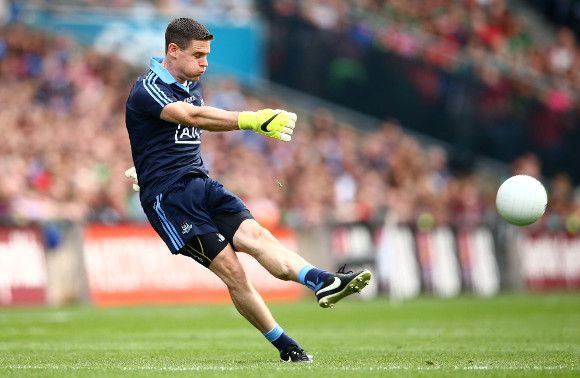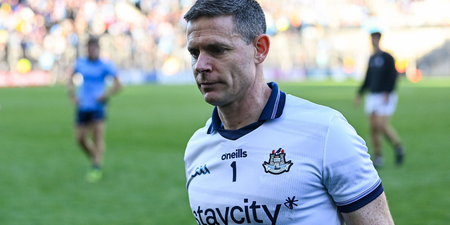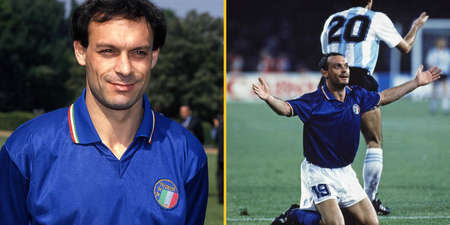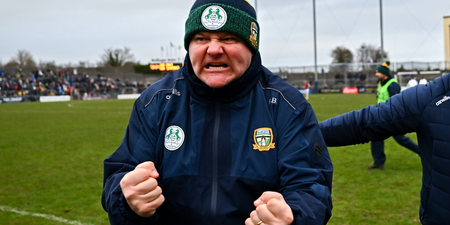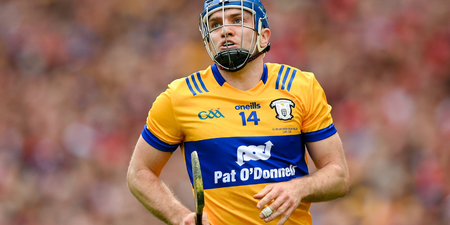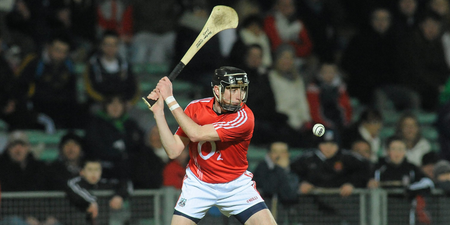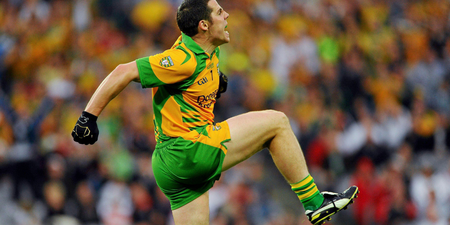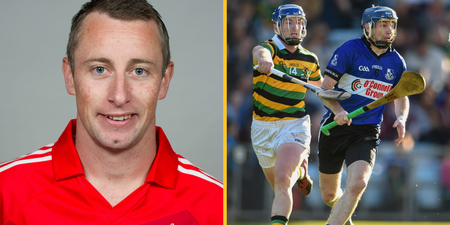A sports psychologist once told me that Gaelic Football is a very simple game.
All it requires to be successful is to gain momentum. Gain momentum and stop momentum coming in the other direction as quickly as you can.
Stop momentum. Get momentum.
Simple.
There was a funny moment on Sunday after Dublin had ripped Mayo to pieces with a ruthless purple patch and looked to have broken the back of the obstacle that lay in front of them.
63 minutes on the clock, Andy Moran having just reduced the seven-point deficit to six, Paul Flynn chancing his arm with a pot shot from wide on the right.
RTÉ commentator, Darragh Maloney, was naive.
“Flynn, having a go himself but lashed it wide. It may not matter at this stage of the match.”
63 minutes. Two scores in it. 12 further minutes that would unfold.
By the 69th minute, there were still four points between them. By the 70th, they were level.
We used to play a little game with some of the underage teams back home – basically just a match with a stop clock – and all it did was prove to them that, in the last five minutes of a contest, you would get at least six clear chances to score. Six.
Panicking and desperately sounding out goal opportunities when they were long since gone wasn’t called for. There’s always time.
When Darragh Maloney – amidst enthralling commentary it must be said – had all but written Mayo off, the men from the west needed just six and a half minutes to pull back the margin. And they had another five and a half to go and win the thing if they really wanted to.
Mayo got their tails up and Dublin couldn’t stop them until the Connacht champions took the foot off the gas themselves and the game crash-landed in a pit of scraps and scuffles and a slight resignation that both sides would rather take the replay rather than risk the loss.
The penalties
Mayo took a goal to help them back into the game alright but the way the pendulum had swung and the way the green and red jerseys were biting and growling and refusing to be banished, it seemed that Dublin were going to continue to retreat until Noel Connelly and Pat Holmes’ men simply busted the door down.
Was Colm Boyle’s attack worth a penalty? Probably not.
Philly McMahon was pretty clumsy charging in gung-ho from the back when Boyle was running up against two sky blue jerseys anyway but it seemed that the Mayo wing back had pirouetted beautifully away from one tackle and saw no end to the defenders so took the decision to become one with gravity instead.
If this happened in the middle of the field, it wouldn’t have been a free kick. The strong, swarming defence would have been rewarded instead and Boyle punished for taking too much out of the ball.
But referees can get carried away in the momentum of a game, too.
Let’s face it though, Paul Flynn was fouled outside the box and Dublin were handed a gift of a penalty in the first half and, if any of the incidents inside the area were penalties over the course of the 70 minutes, it was Aidan O’Shea being dragged down by the neck.
Black cards
Jesus, they’re going to have to go.
A lovely idea in theory but a right royal mess when applied. Or ignored.
Diarmuid O’Connor was in behind the Dublin half back line in the first half, for example, so what did Cian O’Sullivan do? He grabbed him by the jersey and blatantly dragged him back with no other intention but to deliberately stop the Mayo attack.
He got away without so much as a cop-out yellow card. He wasn’t even spoken to by the referee. What’s the purpose of a black card? To cut out cynical behaviour.
What was Joe McQuillan giving the foul for against O’Sullivan if it didn’t warrant a black? Because obviously it wasn’t for the pull.
Then, as usually happens, when the black card is actually given out, it is completely unfounded. Michael Darragh MacAuley was given the line for freeing himself of the shackles of a Mayo man’s grip and simply fouling the opposition player as he stumbles loose and tries to win the ball back.
And his absense was huge – even though his form has been uncharacteristically poor.
The kickouts
Michael Darragh MacAuley went off and Denis Bastick came on, so Dublin did what the pundits and commentators were crying for them to do the whole game – even though they had a perfect kickout record before that.
They went high, long and direct to the middle of the field with Cluxton’s kickouts and, wouldn’t you know, they began to lose out.
And Mayo got that little thing we call momentum.
Then they built on that. They finally started to push up on the Dublin kickout and cut off the spare man option and the capital outfit were put under the sort of pressure that they clearly couldn’t handle in the closing stages of the game.
MacAuley wasn’t there to go hunting for ball and players started to go missing one by one until it was all Mayo and, despite throwing away a seven-point deficit, it was Dublin who felt like they got off the hook a little.
Frees
Niall Morgan is no Stephen Cluxton.
Nor is Cluxton a Diarmuid Connolly.
One of the best moments of the championship to date is when Connolly took the ball in his hands in the second period and told Cluxton to piss off back to his goal line. The greatest player in Ireland called rank and just pinged one with the outside of his boot as routine as you like and showed that Mick O’Dwyer is right when he gasps at the thought of a goalkeeper taking the frees.
Where have all the footballers gone?
Diarmuid Connolly appeal
Diarmuid Connolly punched Lee Keegan after being dragged to the ground – in a black card-worthy offence – by the Mayo man.
He should be grand though.
All he has to do is show the hearings committee the clip of Kevin Keane punching Michael Murphy in the face and the subsequent ruling to downgrade that offence to a yellow card. Remember? Because there wasn’t sufficient evidence (on top of the referee’s report and the video footage) to support the initial red card ruling.
This is the pitiful rod that the GAA has made for its own back.
Aidan O’Shea in isolation
What was Mayo’s plan?
 Noel Connelly and Pat Holmes probably escaped some warranted criticism after the game considering they seemed to have no real strategy whatsoever to try and win the game.
Noel Connelly and Pat Holmes probably escaped some warranted criticism after the game considering they seemed to have no real strategy whatsoever to try and win the game.
They sowed up the backline, they released Boyle and Keegan when they could and then it was just a case of, ‘Ah, sure Aidan’s in there. Grand.’
So they resorted to lumping nothing balls in the general direction of their powerhouse full forward who was forced to go chasing after defenders, run to the wings and, when he did get his hands on leather, he was left on his own as four and five team mates stood back planted on their heels hoping he would wriggle himself free from the attention of three attackers and just do it all on his own.
It was worse when they refused to kick anything in his direction then. Why on earth is your best player inside if you’re not going to use him?
If you want to run the ball, fine. Just don’t leave a monster like Aidan O’Shea out of the equation when he should be the key component of every single facet of Mayo’s play.
But they need to be helping him, not just hoping and praying that he creates magic from nothing.
In a way though, Mayo will come out of that drawn semi final with nothing but sheer optimism.
They were dominated for most of the game and they drew.
They were seven points down and they drew.
They didn’t even begin to use the greatest weapon in their arsenal. And they drew.
Mayo will come out of that game thinking what might be if they just go at Dublin. They’ll come out of it with no fear.
Just imagine now if the GAA abandon consistency and go and suspend Connolly.
And just imagine if Mayo decide to actually use Aidan O’Shea next time around.
God, how could you stop them?




